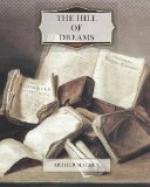Three years after Lucian’s discovery of the narrow lane and the vision of the flaming fort, the August holidays brought him home at a time of great heat. It was one of those memorable years of English weather, when some Provencal spell seems wreathed round the island in the northern sea, and the grasshoppers chirp loudly as the cicadas, the hills smell of rosemary, and white walls of the old farmhouses blaze in the sunlight as if they stood in Arles or Avignon or famed Tarascon by Rhone.
Lucian’s father was late at the station, and consequently Lucian bought the Confessions of an English Opium Eater which he saw on the bookstall. When his father did drive up, Lucian noticed that the old trap had had a new coat of dark paint, and that the pony looked advanced in years.
“I was afraid that I should be late, Lucian,” said his father, “though I made old Polly go like anything. I was just going to tell George to put her into the trap when young Philip Harris came to me in a terrible state. He said his father fell down ‘all of a sudden like’ in the middle of the field, and they couldn’t make him speak, and would I please to come and see him. So I had to go, though I couldn’t do anything for the poor fellow. They had sent for Dr. Burrows, and I am afraid he will find it a bad case of sunstroke. The old people say they never remember such a heat before.”
The pony jogged steadily along the burning turnpike road, taking revenge for the hurrying on the way to the station. The hedges were white with the limestone dust, and the vapor of heat palpitated over the fields. Lucian showed his Confessions to his father, and began to talk of the beautiful bits he had already found. Mr. Taylor knew the book well—had read it many years before. Indeed he was almost as difficult to surprise as that character in Daudet, who had one formula for all the chances of life, and when he saw the drowned Academician dragged out of the river, merely observed “J’ai vu tout ca.” Mr. Taylor the parson, as his parishioners called him, had read the fine books and loved the hills and woods, and now knew no more of pleasant or sensational surprises. Indeed the living was much depreciated in value, and his own private means were reduced almost to vanishing point, and under such circumstances the great style loses many of its finer savors. He was very fond of Lucian, and cheered by his return, but in the evening he would be a sad man again, with his head resting on one hand, and eyes reproaching sorry fortune.




